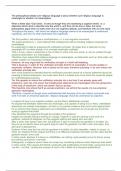Essay
religious language essay
- Course
- Institution
A* marked essay evaluating whether religious language is meaningful or not. Includes the discussion between cognitivism and non-cognitivism and all the key points specified on the philosophy A level syllabus. Useful in order to prepare yourself for the 25 markers, helped me achieve an A*.
[Show more]



